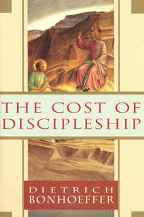The Call to Discipleship
I apologize for the delay in posting this...I am back on schedule now, so I plan to post weekly now! :)
"...you can only learn about obedience by obeying..." -Bonehofer
In this chapter, Bonehoffer paints such a vivid picture about what a disciple's life looks like,
"the disciple is dragged out of his relative security into a life of absolute insecurity...from a life which is observable and calculable...into a life where everything is unobservable and fruitious...out of the realm of the finite...into the realm of the infinite possibilities."
Thinking about this makes me wonder at how God works in our lives. It does not make logical sense in the world's eyes to say that a life of absolute insecurity=a life with meaning and purpose. I think if you were to ask the average person if they want to live a life that is incalculable and filled with insecurity...most would turn it down. But for the Christian, that is what makes God's grace so amazing and something SO worthy of our thanksgiving and praise. No where else can we live a life like this and produce anything, but in God's kingdom, this is the only life that a disciple lives.
"Christianity without discipleship is always Christianity without Christ."
That is a bold and powerful statement. I know we were raised in two totally different denominations. I know that those of you who are from an extremely works-based salvation background cringe at any hint that our salvation can be earned, but let us not react to bad theology by swinging to the opposite pendulum with equal bad theology.
There is a big difference in saying we can earn our salvation and that discipleship, obedience, and action are deeply necessary for a life that knows Christ. I think the difference here is in the fact that our outward works do not redeem us, but rather it is out of an overflow of a redeemed life (thanks to our Lord's grace) that we honor God with our obedience and He then transforms our desires and passions.
Bonhoffer makes this point through a great comparison,
"If a drunkard signs the pledge, or a rich man gives all his money away, they are both of them freeing themselves from their slavery to alcohol or riches, but not from their bondage to themselves...Peter knows he dare not climb out of the ship in his own strength--his very first step would be his undoing..."
It is not enough to turn away from sin in our own flesh, because our flesh is weak. The sinful man will always revert back to filling his sinful passions. The only way to be rid from this is to realize that it cannot be done on our own strength. We will never, on our own, get past our sinful passions. Only in submitting to God, only in becoming a disciple and allowing him to decide each step and move, will we be delivered from the bondage of our sinful man.
"only he who believes is obedient and only he who is obedient believes..."
Romans 1:5 "...Through whom we have received grace and apostleship to bring about the obedience of faith for the sake of his name among all the nations, including you who are called to belong to Jesus Christ..."
"the obedience of faith" I love how Paul makes them one. He does not compartmentalize them, he does not separate them. When we truly begin to look at obedience and faith as one, we begin to ask ourselves questions that demand uncomfortable answers.
This challenges me to examine what I have "believed" in the past. I would encourage everyone to take some time about beliefs that we really hold dear to our hearts that have no actual influence in our actions and decisions.
A personal example for me comes in how I devote my time. Yes, I believe that spending time daily in prayer and God's word is vital to my spiritual life. I could passionately defend why every believer needs to be delving into God's word and diligently studying it. I could write for hours about prayer and how I have seen it transform lives.
Do my actions consistently line up with those beliefs. I confess sadly, no. Then I have to ask myself, doI really believe? What makes up my beliefs? A belief has to be more then just a concept I agree with in my head, it has to be something my heart grasps ahold of and acts upon. If I truly applied the principle that where I am disobedient, I do not believe...I would have to make some very alarming statements.
I would have to say at the end of a busy day where my prayers consisted of a quick thanks for the meal that "I do not believe prayer is a necessary part of my daily life." When I pass up an opportunity to incarnate God's love to someone who is hurting in exchange for some time to myself, I have to say, "I believe that having time to myself to relax is more important then that hurting person's soul." When I crack open the stack of books I want to read or turn on the TV to watch that movie I have been wanting to see when I haven't opened my Bible in days, I have to say, "I believe that reading books and watching movies is a better use of my time then God's word."
The last part of the chapter again challenged me to think about the life a disciple must live. Often, I hear Christians explain accepting Christ like it will will lead to this incredible life filled with purpose and meaning...it will fill a void...it will complete them, make them truly human. While I agree with each of those statements when Christ called someone to him, he didn't present this pretty, great package. He challenged them, if you hate your father and mother, you are worthy...can I burry my father? no, let the dead bury their own dead, come now... keeping all the commands is not enough...sell it all, follow me. Christianity is an extreme faith that calls for an extreme, radical life that does not quite fit in the box that the world tells us is "the good life."
Discussion Questions:
1. Bonehofer states, "Nothing on earth, however sacred, must be allowed to come between Jesus and the man he has called--not even the law itself."
thoughts? how does this apply to your own life or your families?
2. Why do we separate our beliefs from our actions?

